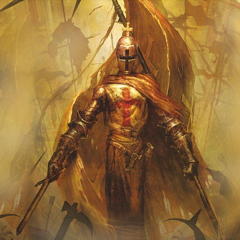It’s the same title but the opposite take.
I disagree with him on several levels.
And since I know there will be digital ringside hecklers, no, disagreement doesn’t mean the other person is hated or disrespected. In fact, between intelligent people, disagreement can result in at least one of them, and sometimes both, refining their thinking to achieve better approximations of reality as it is, since after all, we all see through a glass darkly.
So what are my disagreements?
Let us go through them in order.
It is not true that every writer has copied the styles of other writers.
The current debate about AI in which many writers are engaging is, for the most part, an entirely false one. The truth is that even the most highly-regarded writers, particularly in the SF/F field, have always engaged in highly-imitative practices, not merely limited to the various plots, characters, and worlds, but even the literary styles of other authors. And they have done so intentionally; ironically, the better the writer, the more often they have engaged in these imitative practices.
He goes on to quote an admission to this by Roger Zelazny, but…
- I don’t consider Roger Zelazny to be a great writer. In fact I have never thought much of his writing or stories.
- The writers I do admire are for the most part not very well known. Zachary Mason is one, and ironically his debut novel is an astonishing one The Lost Books of the Odyssey. Ironically, this novel is something like 50 summarised pieces or versions of the Odyssey. So you could say it is a hyper-imitation of Homer. Yet I simply do not buy the premise Vox relies on, even if Mason can certainly fit the mould strictly speaking.
- Tolkien is another and I don’t think he copied anyone’s style.
- Dan Simmons either.
But above all, it is not my personal experience, and while I know it would be easy to criticise me by saying I am not a great writer, I do have over a million words in published format, and while certainly many writers may have influenced me, there is none whom I have intentionally tried to emulate in any way in any of my books. And I simply do not think anyone worthy of being called a decent writer would really do that other than as a kind of divertimento .
Sure, it might be subjective and even harder to quantify objectively with writers, but just like I do not consider everyone who ever put brush to canvas a painter, or everyone who moulded something out of rock or metal a sculptor, I do not consider every writer an artist.
And when it comes to art, a Michelangelo or a Tintoretto or a Frank Frazetta or Boris Vallejo can be thought of as artists. The retarded frauds of “post-modernism” (the CIA funded uglification of beauty) who tape a banana to a wall on the other hand, cannot be.
But Vox makes his position clear:
But in my opinion, it is absolutely and only the end result that matters; literally no one cares that William Shakespeare merely revised the plays originally written by Lord Thomas North instead of penning them from scratch.
It is a secularist and materialist position. One I share only in the principle, but not at all in its ingredients.
Vox makes a Protestant cake. And while the consumers of it probably can’t tell the difference, it lacks soul. It lacks the je ne sais quoi of humanity.
You could train an AI to read all of the collected works of Philip K. Dick and het it to write you a short story in his style, and it would probably be very good. And maybe PKD too would be astonished by it; but I doubt he would like it. He probably would prefer if a madman like me came along and broke the AI trying to impersonate him.
Vox’s argument is basically that if the machine can fool the readers then why not?
It’s utilitarian, sure, but is it the same as the organic? No.
And it is not so for Vox either.
If it were, he would take his theological musings to a digital AI version of Jesus.
I mean, why not, right? All we have about Jesus after all is only all the words he said that were noted down and what people have written about Him. So why not? The result is all that matters right?
No. It isn’t.
You reading this know it too.
I have never agreed with the statement that the ends do jot justify the means. It’s yet another nonsensical Anglo-based idea like the absurdity of “free speech” ever having existed anywhere on Earth. Any Venetian child knows such a thing is straight up utopic nonsense.
The ends ALWAYS justify the means, at least if you are not retarded. Why? Because anyone of at least what *I* consider normal intelligence, will factor in ALL the costs of the “means”; including emotional costs.
AI has no humanity, and no matter how you spin it, there is something important about that.
The main “hook” of AI is that it flatters the user.
It’s the magic mirror on the wall that tells you every morning that YOU, yes YOU, are the prettiest of all the princesses, and the smartest person in the room too!
And AI will continue to help diminish the humanity of human beings, much as the “Protestant work ethic” has done.
So I agree that the end result is what counts.
Because if it lacks the human part of the artist, then it is not art at all, merely a mechanism to mechanise you.
Personally at least, I will continue to greet everyone I meet as I find them; enjoy their flaws as they get to help me remember that we are all fallen, and flawed, and weak.
AI is not the answer.
This post was originally published on my Substack. Link here







